Senate budget funds teacher salaries through other ed cuts
Senate budget writers propose slashing the number of teacher assistants in order to save $233 million, which would pay for about half of the plan to raise teacher salaries.
Posted — UpdatedDuring a news conference Wednesday, Senate leaders boasted that their spending plan would be the largest pay increase for teachers in the state's history. But they declined to say how they would fund that pay boost without a tax increase.
Senate budge writers save $233.1 million a year by cutting funding for classroom teaching assistants in kindergarten through third grade in half. The new funding formula would effectively provide teaching assistants only in kindergarten and first grade.
The state currently funds 16,448 teaching assistants statewide. Federal and local funds pay for another 6,800 assistants.
"How can we help them be successful if we don't have these extra hands and extra dose of instruction?" asked Carrie Scarlett, a first-grade teacher at Brentwood Elementary School in Raleigh.
Scarlett said she relies on longtime teaching assistant Kristel Osborne-Ebron to ensure no one falls through the cracks.
"They need a lot of one-on-one assistance, and teachers can't be everywhere and work with every student," Osborne-Ebron said.
Both Osborne-Ebron and Scarlett said they fear the impact of the cuts in the classroom.
"It’s very unnerving because this is my livelihood and it’s how I take care of my family," Osborne-Ebron said.
"You kind of step back and say, 'OK, how can I do this myself?'" Scarlett said. "We teach, we’re counselors, we’re parents, we’re nurses – we do everything."
Sen. Jerry Tillman, R-Randolph, said school districts can use local funds to keep teaching assistants in second and third grades or shift other resources around.
"School systems were given the flexibility – already have it now from last year – to put teacher assistants and teacher money together and hire more assistants," Tillman said. "Put them wherever you want to. We're saying K-1 is the best place."
Area school districts were crunching the Senate's budget numbers Thursday to determine the local impact on their operations, but Superintendent of Public Instruction June Atkinson and Gov. Pat McCrory immediately expressed skepticism at the Senate plan.
"These cuts will eliminate essential services for teachers and schools and leave teachers with more duties and less support," Atkinson said in a statement. "At elementary schools, the loss of teacher assistants means less time for teachers to teach and more time on bathroom duty, lunch duty and bus duty, not to mention the loss of an extra instructional assistant in the classroom."
McCrory said he is looking for a more long-term approach to teacher pay "so it’s a career as opposed to a one-time pay increase."
"We have a major difference with the Senate," he said.
Other large chunks of savings in the education arena come from the state's projection of fewer students in the classroom next year. This average daily membership, or ADM, projection allowed Senate budget writers to save $37 million because there will be fewer teachers needed. The same reduction in ADM appears to allow a $64 million cut in the funding set aside for "certified personnel."
Overall, spending on K-12 education would tick up by $66 million under the Senate budget plan over what it would have been.
Senate leaders on Thursday will discuss the details of their public education spending plans, as well as the rest of the $21 billion budget. Advocates who had not seen the budget Wednesday were leery that gains in teacher salary would come at the cost of other educators.
"Cutting programs and people in a system that has already been cut to the bone is not the way to go," Mark Jewell, vice president of the North Carolina Association of Educators, said Wednesday when asked about the possibility teacher aides could be cut to pay for increases to teacher salaries.
In addition to cuts, the Senate budget appears to rely heavily on savings and the anticipation that tax revenues will begin to grow modestly in the coming fiscal years to fund the teacher salaries.
Related Topics
• Credits
Copyright 2024 by Capitol Broadcasting Company. All rights reserved. This material may not be published, broadcast, rewritten or redistributed.





